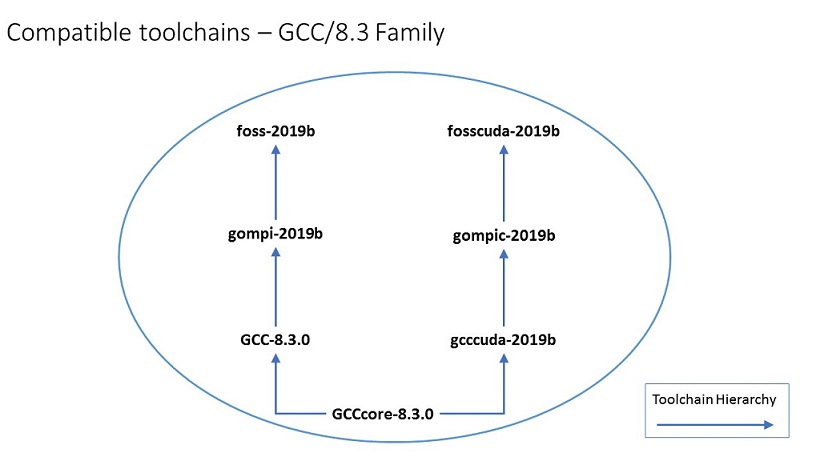Available Toolchains and Toolchain Compatibility: Difference between revisions
| Line 62: | Line 62: | ||
==Toolchain compatibility== | ==Toolchain compatibility== | ||
On Sapelo2, software modules built by EasyBuild generally have names in a format like '''Name/Version-Toolchain'''. When you load more than one software module built by EasyBuild, please make sure that they are built with '''the same or compatible toolchains'''. You can check this by looking into software modules' names. If there are any incompatible toolchains involved in loading modules, it will end up with failing dependencies or Lmod errors, like this: | * On Sapelo2, software modules built by EasyBuild generally have names in a format like '''Name/Version-Toolchain'''. When you load more than one software module built by EasyBuild, please make sure that they are built with '''the same or compatible toolchains'''. You can check this by looking into software modules' names. If there are any incompatible toolchains involved in loading modules, it will end up with failing dependencies or Lmod errors, like this: | ||
<pre class="gscript"> | <pre class="gscript"> | ||
| Line 73: | Line 73: | ||
[[File:Sapelo2 common compatible toolchains – GCC8.3 resized.jpg]] | [[File:Sapelo2 common compatible toolchains – GCC8.3 resized.jpg]] | ||
Also please note that, when a '''conflicting module''' is loaded, one or more dependent modules of the software previously loaded could be replaced, and thus results in the software previously loaded being broken. | * Also please note that, when a '''conflicting module''' is loaded, one or more dependent modules of the software previously loaded could be replaced, and thus results in the software previously loaded being broken. | ||
------ | ------ | ||
[[#top|Back to Top]] | [[#top|Back to Top]] | ||
Revision as of 13:47, 9 July 2020
Note: This page is for using new queueing system on the Sapelo2 cluster. This page is still under development as of June 22-26, 2020.
If you are current Sapelo2 users, please come back later.
We use EasyBuild to build most of the software modules on the Sapelo2 cluster. Easybuild is a software build and installation framework that allows us to manage scientific software on High Performance Computing (HPC) systems in an efficient way. EasyBuild employs so-called compiler toolchains or, simply toolchains for short, in handling the build and installation processes. A typical toolchain consists of one or more compilers, usually put together with some libraries for specific functionality, e.g., for using an MPI stack for distributed computing, or which provide optimized routines for commonly used math operations, e.g., the well-known BLAS/LAPACK APIs for linear algebra routines. For detailed info about EasyBuild and its toolchains, please refer to EasyBuild and toolchains
Avaliable toolchains on cluster
- Common compiler toolchains on the Sapelo2 cluster:
| Name | Version | Compiler(s) | MPI library | Linear algebra library | FFT |
|---|---|---|---|---|---|
| foss | 2019b | GCC/8.3.0 | OpenMPI/3.1.4 | OpenBLAS/0.3.7, ScaLAPACK/2.0.2 | FFT/3.3.8 |
| gompi | 2019b | GCC/8.3.0 | OpenMPI/3.1.4 | ||
| GCC | 6.4.0-2.28, 8.3.0, 9.2.0 | GCC | |||
| GCCcore | 6.4.0, 8.3.0, 9.2.0 | GCCcore |
- Compiler toolchains with GPU/CUDA support on the Sapelo2 cluster:
| Name | Version | Compiler(s) | MPI library | Linear algebra library | FFT |
|---|---|---|---|---|---|
| fosscuda | 2019b | GCC/8.3.0, CUDA/10.1.243 | OpenMPI/3.1.4 | OpenBLAS/0.3.7, ScaLAPACK/2.0.2 | FFT/3.3.8 |
| gompic | 2019b | GCC/8.3.0, CUDA/10.1.243 | OpenMPI/3.1.4 | ||
| gcccuda | 2019b | GCC/8.3.0, CUDA/10.1.243 |
For a complete list of EasyBuild toolchains, please refer to List_of_known_toolchains
Toolchain compatibility
- On Sapelo2, software modules built by EasyBuild generally have names in a format like Name/Version-Toolchain. When you load more than one software module built by EasyBuild, please make sure that they are built with the same or compatible toolchains. You can check this by looking into software modules' names. If there are any incompatible toolchains involved in loading modules, it will end up with failing dependencies or Lmod errors, like this:
Lmod has detected the following error: These module(s) exist but cannot be loaded as requested
Toolchains belonging to GCC/8.3.0 family are all compatible with each other. They are shown as below. The blue connection lines with arrows give toolchain build hierarchy, for example, GCC-8.3.0 is built on the top of GCCcore-8.3.0.
- Also please note that, when a conflicting module is loaded, one or more dependent modules of the software previously loaded could be replaced, and thus results in the software previously loaded being broken.
